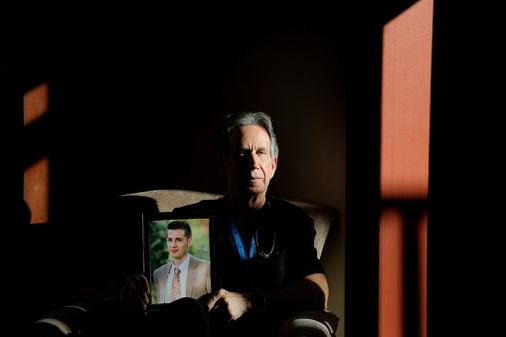Mass becomes first state to stop asking doctors about past mental illness and drug use – The Boston Globe
Now, in an effort to combat stigma and burnout among medical professionals, Massachusetts has become the first state to eliminate questions about providers’ mental illness and addiction throughout the health care system. In about two dozen other states, professional boards that license doctors have stopped the practice. After Massachusetts went further: scrubbing the questions from credentialing forms used by virtually every hospital, health system, insurer and medical licensing board in the state.
It’s a monumental step forward, said Dr. James Baker, president of the Massachusetts Society of Addiction Medicine and a physician at a hospice care facility in Haverhill. The power of the new policy is that it opens the door for struggling physicians. With depression, anxiety and substance use disorders to get the help they need without fear.
These questions stem from the idea that medical professionals should be held to a higher standard, and because lives hang in the balance if they are under the influence of alcohol or drugs on the job.
Additional studies have found that questions about mental health history and past drug use have long had a chilling effect on doctors seeking professional help. In a 2017 survey, nearly 40 percent of American physicians said they would be reluctant to seek treatment for a mental health condition because of concerns about repercussions to their medical license. In a separate study, nearly half of female doctors said they met criteria for mental illness, but did not seek treatment in part for fear of being reported to a medical licensing board.
The push to root out questions about drug use and mental health is gaining momentum during the pandemic amid rising rates of burnout and mental distress among physicians. Forty-six percent of health workers nationwide reported frequently feeling burnout in 2022, up from 32 percent in 2018, according to a survey published last fall by the Centers for Disease Control and Prevention. Each year, an estimated 300-400 physicians kill themselves, and the suicide rate in the profession is more than double that of the general population, according to an American Psychiatric Association analysis.
However, it was the high-profile death of a New York doctor in the early days of the pandemic that galvanized hospital and medical professional associations to address the issue.
In April 2020, Dr. Lorna Breen, an emergency room physician at New York Presbyterian Hospital in Manhattan, was overwhelmed by the relentless number of sick patients, many of whom died in the hospitals, waiting rooms and hallways, her family said. After working a string of 12-hour shifts, Breen called her sister to say she couldn’t get out of her chair at home. Worried, family and friends drove Breen to her childhood home of Charlottesville, Va., where she Checked in an in-patient psychiatric unit.
While in the psychiatric unit, Breen repeatedly told relatives that she feared losing her medical license and hospital credential because she sought mental health treatment, according to family members.
Days after expressing these fears, Breen took her own life.
The questions absolutely contributed to [Breens] Death, said J. Corey Feist, who is Breen’s brother-in-law and co-founder of a national foundation that advocates for removing stigmatizing questions from the medical credentialing and licensing process. Much of her self-identity was inextricably linked to being a doctor. … When you threaten to take away this lifelong pursuit, it can result in suicide.
In recent years, medical boards in at least 26 states have changed the language of their licensure applications to remove questions related to physician mental health changes that affect 673,000 doctors nationwide, according to the Dr. Lorna Brien Heroes Foundation.
It took more than a year of hard work to find and remove the language. The Massachusetts Health and Hospital Association began collecting credentialing forms from every hospital, health insurer and medical licensing board in the state. Staffers in the association then carefully comb through the scores of forms many numbering 20 pages or more to identify potentially stigmatizing questions about past treatment or diagnosis of a mental illness or substance use disorder.
Many of the forms have not been updated in decades and reflect outdated views on the nature of addiction and mental illness, the association found. Some asked questions about past mental health treatment and substance use in the same category as questions about criminal convictions. Many of the hospitals and health insurance plans used a standard form that has not been updated since 2004.
Dr. Steve DeFosses, a neuroradiologist at Tufts Medical Center and vice president of clinical integration at the state hospital association, said the questions are a huge disincentive for doctors seeking help for mental health and substance use problems. In hospitals, such a credential Forms are shared with up to three dozen hospital staff and administrators, from the hospital’s credentials committee to the board of trustees, DeFosses said.
If someone has a condition that’s still stigmatized, there’s no reason for them to reveal it to dozens and dozens of strangers and colleagues with them, DeFosses said. The alternative is for doctors to hide it and not get the help they need.
A combination of high stress levels, long hours and repeated exposure to trauma can make health care workers especially prone to burnout, according to physician groups. Across the state, there are confidential peer support groups designed for health care workers; And the Massachusetts Medical Society offers a program, known as Physician Health Services, that provides therapy and monitoring for doctors with substance use and mental health problems.
Baker is not ashamed that he sought psychiatric counseling for his grief after losing his 23-year-old son Max to a heroin overdose seven years ago. But he has resigned to having to disclose this fact every two years when he renews his credentials. Typically, he puts an asterisk next to the question and scribbles in a brief explanation, noting that he sought psychiatric care due to a family tragedy.
What happened to my son was a terrible tragedy, but the fact that I sought care for him should be my private business, Baker said. These questions do not improve patient care. All they do is stop physicians from seeking care for themselves.
Chris Serres can be reached at chris.serres@globe.com. Follow him @ChrisSerres.
#Mass #state #stop #doctors #mental #illness #drug #Boston #Globe
Image Source : www.bostonglobe.com







